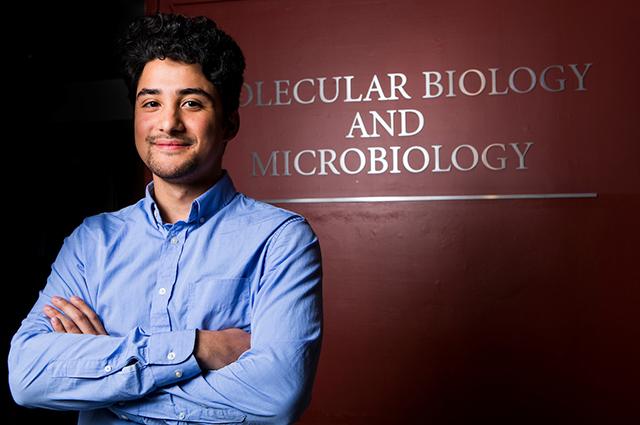A Fellowship Recipient Looks Back
For Shailab Shrestha, a fifth-year PhD student in Molecular Microbiology at Tufts, the seed for a career in biomedical science was planted while spending summers working in a lab at the small liberal arts college he attended in Upstate New York. He further bolstered his résumé as a technician in a bacteriology research lab within the New York State Department of Health (NYSDOH).
By 2017, Shrestha was ready and excited to apply for PhD programs, but as an international student (originally from Nepal), he also had concerns. “When applying to programs, it can be hard to tell whether there will be positions available to international applicants because we aren’t eligible for the federal training grants” that would normally support PhD students, Shrestha says. “It’s kind of a black box.”
A growing number of fellowships at the Graduate School of Biomedical Sciences are helping to illuminate that black box and increase opportunities for PhD students. Since the beginning of the Brighter World campaign, alumni, faculty, and friends have contributed more than $1.85 million toward this purpose. Some fellowships, like Shrestha’s, provide support to new students in their transition into PhD training. Others give students a professional development “boost” when they’re further along in their studies and looking to enhance their scientific, professional, or leadership development.
Tufts’ Molecular Microbiology program was already number one on Shrestha’s list. It was recommended to him by his lab PI at NYSDOH—who did not attend Tufts—for its strong faculty. And, he was immediately struck by the warm welcome he received on his interview day. What he didn’t know until then was that a former student had just made a generous gift to establish a fellowship for applicants like him. “To know that there’s this kind of support coming from the school—that definitely played a big part in my decision to come to Tufts,” he says.
With his dissertation defense just a few months away, Shrestha reflects on how the fellowship support during his “defining” first year set him up for success. In addition to taking foundational coursework, Shrestha rotated in four faculty labs that year, two months apiece, and got to know different faculty and explore specific research areas before selecting Aimee Shen as his thesis advisor.
Shrestha appreciates the opportunities he has had at Tufts to build relationships with supportive peers, postdocs, and faculty. “The science that I’ve been able to do is amazing,” says Shrestha. “But working on a PhD for four or five years does get hard. It’s really important to feel like you have a community around you that can support and motivate you.”
Fellowships also “make a massive difference” in shaping the GSBS community. Since his first year at Tufts, Shrestha has seen a “clear divide” in the types of students who matriculate as more fellowship funding is available. “The school can recruit people who might not otherwise have been able to attend, people from diverse backgrounds – students who deserve to be here.”
Having a named fellowship has further motivated Shrestha, who shares similar life experiences with the person who established his fellowship. “[The donor] understood the struggles” some graduate students face, and through the fellowship has made Shrestha feel “appreciated”. “Tufts was willing to give him a chance in accepting him into the PhD program. And he wanted to give other people the chance to do this.”
Learn how you can support fellowships at GSBS
To learn how you can honor GSBS students with a fellowship gift, please email Roxanne Beal, director of development for biomedical sciences or call her at (617) 636-2417.
